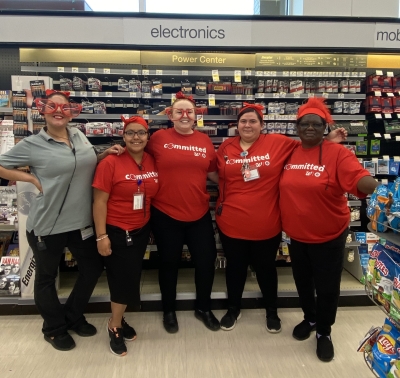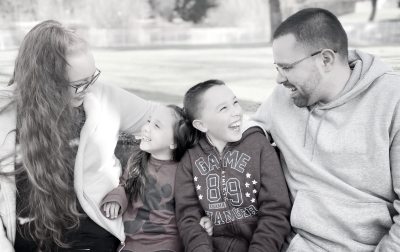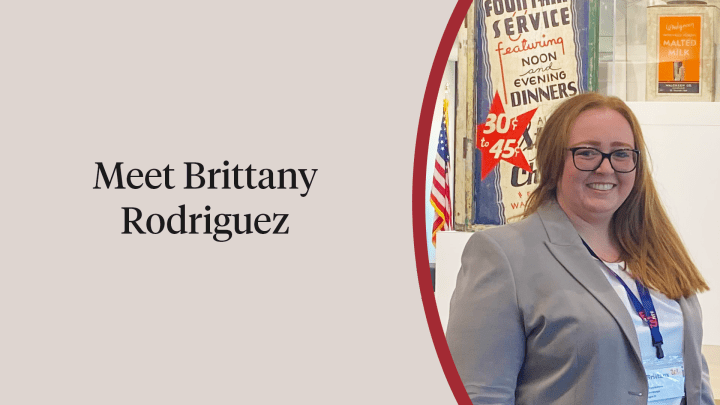My name is Brittany Rodriguez. I am a wife, mother, teacher, risk taker, empathetic listener, problem solver, sometimes a detective-counselor-psychologist, an avid baker, a disability advocate and a certified Walgreens store manager at store #6758.
How it started
I had always wanted to be a teacher and went to college to attain my degree in education. Like many of my peers, I got a part-time job at a retail store, not knowing then that it would turn into something more than just a college gig
Almost immediately, I fell in love with the excitement of it all: the products, the schedules, and the personalities of the customers, coworkers and hundreds of others you encounter daily. There is never a dull day in retail, and each work shift presents new opportunities to solve problems, lend a helping hand or sympathetic ear, learn new skills and train others. The retail industry presented itself as the perfect classroom for me to teach. I was hooked from the get-go.
I started building my résumé with leadership positions at several large retail brands across a few different cities and states, and eventually found my home at Walgreens in 2015 as an assistant store manager trainee.
Walgreens attracted me with its dedication to community and building lasting relationships, which are both among my passions. Also, as someone who lives with a fluency disorder that presents as a stutter, I wanted to be part of an organization that values diversity in the workplace and supports individuals with varying abilities—a place where it feels like Disability Pride Month all year long and not just during July. Walgreens has a long-standing history of maintaining a diverse workplace and employing, uplifting and promoting individuals from all backgrounds, skills and abilities.
How it’s going
As I progressed in my career at Walgreens, my family and I relocated to the Dallas-Fort Worth area where I am the proud manager of a busy store in Arlington, Texas. In addition to managing the daily operations of my store, I find joy in the human aspects of the job. From motivating my team and training colleagues to resolving customers’ concerns and celebrating daily life in the community, the opportunities to interact and help people are plentiful throughout any given day.

I am proud to say that my store’s team is highly engaged and enjoys their work, and not because I’m some sort of superhero or have some magic method. The most important skills for a store manager to possess are quite simple: empathy, patience and communication.
We all have good days and bad days. This is especially true for people who are overcoming unique challenges, like the ones I manage with stuttering. While many individuals with fluency disorders have learned to navigate their symptoms to the point that strangers wouldn’t notice, there are certain factors that impact the severity of symptoms day-to-day. Some people, like me, are challenged with saying certain sounds—”H” can be difficult for me—while others may have a tough time with specific words. Sometimes, stuttering can be triggered by stress, anxiety and even excitement, each day can be different. Managing a fluency disorder has highlighted the value of my store manager skillset even more.
Taking the time to talk and listen to my team on a regular basis, and not always about work-related topics, is vital to running my store—any store. Helping them resolve a personal conflict or explaining why a certain process exists at work creates a deeper connection that is priceless for motivation. In turn, these actions instill the importance of communication in my team’s interactions with customers and patients. Giving somebody the time to talk and express their frustrations are often the solutions to many of our customers’ issues. There isn’t a single person who can solve all problems, but all people desire to be heard, understood and validated.
My work beyond the store
This year I was selected to be part of the Walgreens National Feedback Forum, which has been among the most amazing experiences of my career. Through the Forum, I meet with leaders, peers and team members throughout the country to discuss important issues facing our organization, brainstorm solutions and advocate on behalf of my team members, pharmacy staff and our customers.
I am also an active member of the Walgreens Disability Alliance, a business resource group led by team members that allows people living with a disability to discuss a variety of topics, support one another and teach other colleagues. Most importantly, it enables team members with varying abilities to advocate and create change.
My involvement in the BRG also led me to share my experiences as a guest blogger with the Stuttering Foundation. Additionally, Fast Company magazine interviewed me for an article on how to accommodate people with a stutter in the workplace. The publication wanted to bring awareness to the challenges of people with fluency disorders and how organizations can accommodate their employees and even prospects—job interviews can be especially challenging for people with a stutter and the symptoms can often be misinterpreted as a lack of confidence, honesty or knowledge.
In addition to the Disability Alliance business resource group, Walgreens has the Retail Employees with Disabilities Initiative (REDI) program, an externship for adults with disabilities to receive training in Walgreens stores. The program accepts adults with both apparent and non-apparent disabilities, such as fluency disorders, who work alongside a Walgreens work coach to learn various skills throughout the store. Upon completion of the program, the participants receive a certificate and are then placed into jobs within their communities. Often, if the training store has a need for additional help, REDI participants will get hired at the Walgreens store where they trained. The program works with local, regional and national nonprofit organizations, as well as local schools and higher education institutions. Additionally, Walgreens has a similar program called Transitional Work Group for hiring people with disabilities at its distribution centers, and a more than decade-long partnership with Turning Pointe Autism.
My plans for the future
My husband and my two kids are my biggest cheerleaders and sources of support. With them by my side, I feel like I can do anything and accomplish everything I set out to achieve. I try to keep a healthy work-life balance to ensure I am there for them and celebrate their victories as much as they celebrate mine. I am a proud soccer mom, baseball mom, karate mom and cheer mom, in addition to being a volunteer for the Girl Scouts’ Brownie troop.

Now that my kids are a bit older—my daughter is 8 and my son is almost 13—my husband and I want to plan some more fun trips with them. We recently visited Puerto Rico and fell in love. It was one of the most beautiful places I ever visited, and my entire family was just swooped away with the food, culture and lifestyle.
We also took a cruise last year and had ports of call that included the Dominican Republic, St. Martin and St. Thomas. My kids fell in love with cruising and have been begging me and my husband to set sail once again. We haven’t picked a destination yet, but we are definitely going to need to have our passport photos taken at Walgreens for the next big travel adventure.
Professionally, I want to continue growing and building my career at Walgreens. In addition to working with my team members to help them achieve their goals, I also started working as a project coach to train and develop emerging store managers. Likewise, I am part of the recruitment team for emerging store managers and unassigned store managers in the Fort Worth area. Through this program, my colleagues and I build talent by hosting seminars, classes and monthly checkpoints where we answer questions, discuss projects they are working on and mentor them.
Similarly, I want to continue advocating for people with disabilities and be an integral part of the Disability Alliance at Walgreens. Since it is rare for fluency disorders to persist into adulthood and even more rare for females—stuttering affects four times as many males as females—I feel there is a lot of work to be done in building knowledge and understanding. Due to the lack of awareness, communication challenges are still not discussed as much as they deserve, and they are still often emulated, mimicked and parodied in pop culture. This must change.
I want others to learn how to be more accepting and comfortable when interacting with people with fluency disorders, and I also want people with varying abilities to know that there is nothing holding them back. I believe everyone should embrace doing things that scare them a little, regardless of challenges. Bungee jumping, karaoke and public speaking were once terrifying to me, but now I eagerly participate in all these activities with pride and without hesitation. This, I believe, is the main message of Disability Pride Month that should be carried throughout the year.




